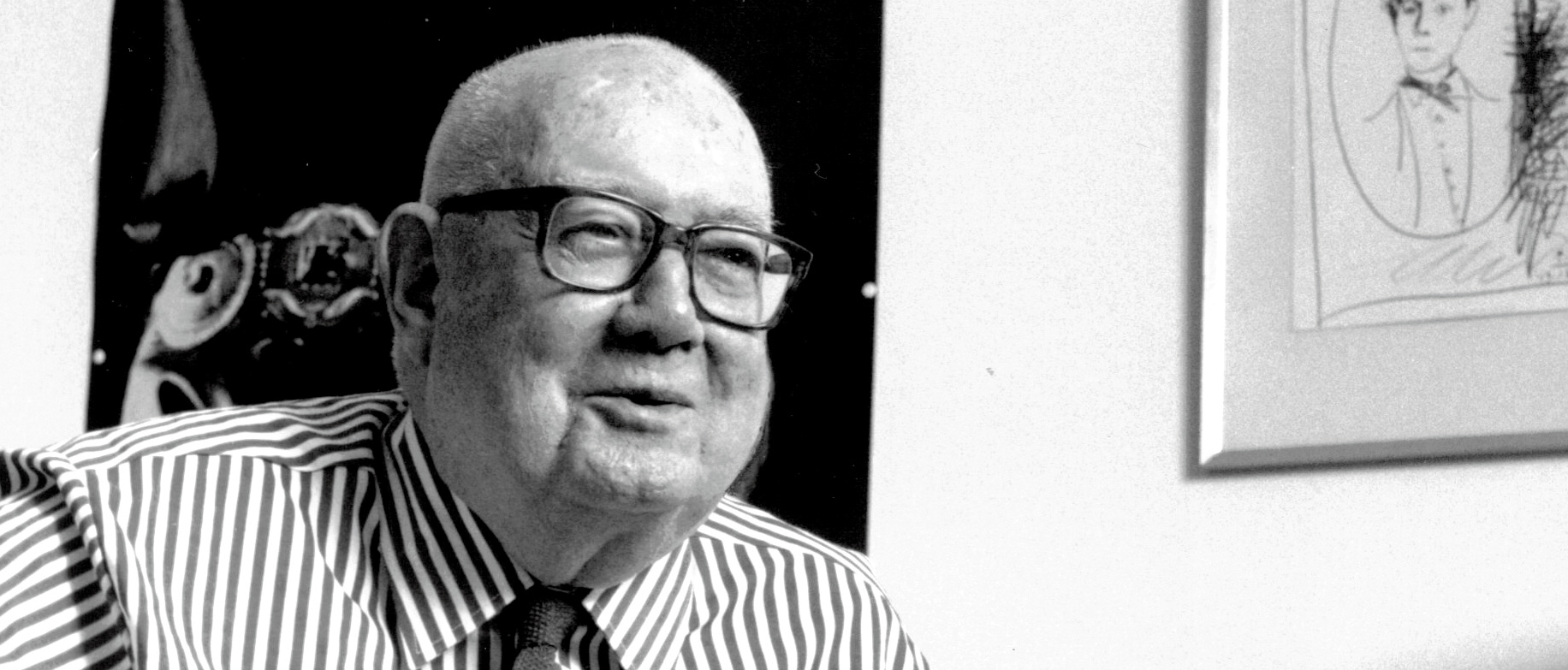In Letter to a Man in the Fire, the late writer and longtime Duke professor Reynolds Price ’55 makes an eloquent case for the existence of a caring God. He pauses at one point in this extended essay, which draws on his own nearly fatal battle with cancer, to acknowledge that his sincere hope for an afterlife “would seem lunatic to many of my university and writing colleagues.”
That’s exactly how such sentiments sounded to me when I arrived at Duke in the fall of 1991. Having grown up Catholic in southern Pennsylvania, a land of blue-collar towns nestled amid a sea of farms, I couldn’t wait to escape the deeply ingrained religious convictions that abounded there.

Spiritual confirmation: Fowlie showed students how extraordinary intellect and profound faith could coexist
It was thrilling then to study English in the department ruled by controversial literary critic Stanley Fish. Under his leadership, longstanding ideas about the meaning of literature, even the act of reading itself, were getting overturned, attracting national notoriety. For many of Fish’s colleagues, Reynolds Price notwithstanding, truth in literature and the larger world was relative and the notion of God passé. A university founded by Methodists was now also a playground for some very influential postmodernists. And I could hardly wait to join the party.
I went to Mass my first weekend on campus and didn’t go back for a long time, steeping myself instead in the work of French existentialist Albert Camus and his bleak view of life. Like much of the English department faculty, he didn’t think that faith and intellect could be reconciled productively, and neither did I. Camus was also, rather famously, a very unhappy guy—and, increasingly, so was I. Like the lost pilgrim in Inferno, I needed a Virgil to guide me out of this thicket of misconceptions. About halfway through my Duke career, I found him in Wallace Fowlie, Duke’s resident Dante expert.
By 1993, when I signed up for his class on Marcel Proust, Fowlie was eighty-four years old and had taught at Duke for nearly thirty years. He was a renowned literature scholar and phenomenally popular with students. He had befriended a virtual hall of fame of twentieth-century writers and artists—T.S. Eliot, Robert Penn Warren, Henry Miller, Robert Lowell, Anaïs Nin, Jacques Maritain, and Jean Cocteau, to name a few. Even better, as far as I was concerned, he’d once received an admiring note from Jim Morrison, legendary front man for The Doors, who toted around Fowlie’s groundbreaking translation of Arthur Rimbaud’s poetry. Within a year of my first meeting him, Fowlie would publish his memoir Rimbaud and Jim Morrison: The Rebel as Poet. “It’s a book,” he once told me with a chuckle, “about a great poet and a much lesser one.”
I assumed that anyone as worldly and learned as this must be agnostic and maybe even a hard-core atheist. And so I was caught off-guard one spring evening when I visited Fowlie’s apartment in Chapel Hill with a small group of classmates. We were taking in the art on his walls, which included original pieces by Picasso and Picabia, and peppering him with questions. I stood in the dim light, half-listening to his soft, baritone answers, more entranced by a giant poster of Jim Morrison, when I heard Fowlie say, "Well, of course, I'm Catholic."
Had I misheard that? Here was a man of extraordinary intellect, whose knowledge and sophistication far exceeded that of anyone I’d ever met, and he was saying that he was Catholic, that he accepted all the rewards and demands and bafflement that came with this ancient, inspiring, infuriating faith. It was a transformative moment, eventually leading me to see that I—and my wayward mentor Albert Camus—had it all wrong. You could, in fact, commit to a life of the mind and of the spirit—and you were shortchanging yourself if you didn’t honor both.
Fowlie delighted in melding these two worlds in his teaching and writing. His memoir Aubade includes a highbrow chapter on “Proust, sexuality, and art,” followed by a plain-spoken explanation of why he converted to Catholicism. Given the opportunity to deliver a homily at Duke Chapel, he offered a meditation on Jesus’ crucifixion in Luke 23 juxtaposed with passages from Samuel Beckett’s Waiting for Godot, a modernist play about the absence of God. The push and pull of faith and intellect—and the creative energy generated in the turbulent space between them—became a central theme of our many conversations. It’s a tension, in fact, that’s proven very fruitful in my own dual careers as a secular speechwriter and journalist and Catholic author and essayist.

Courtesy Stephen Martin
From Fowlie, I learned there are such things as eternal truths, and we have a soul to grasp them. There’s also danger in chaining ourselves to unyielding opinions, so we have a mind capable of adapting. His constant explorations of faith kept him alive to mystery and comfortable with his own incompleteness. Meanwhile, his intellectual nimbleness in spanning disparate eras and finding the best in all of them—from the ‘20s to the ‘90s, from Rimbaud to Jim Morrison—created powerful bonds in the classroom.
Fowlie died in 1998, just shy of his ninetieth birthday. He left behind about forty books he had written and more than 6,000 students—and a model for living that embraces struggle and, in the spirit of his good friend Reynolds Price, nudges us toward grace.
Martin ’95, a former Duke Magazine intern, is author of The Messy Quest for Meaning: Five Catholic Practices for Finding Your Vocation and blogs at www.messyquest.com.

Share your comments
Have an account?
Sign in to commentNo Account?
Email the editor